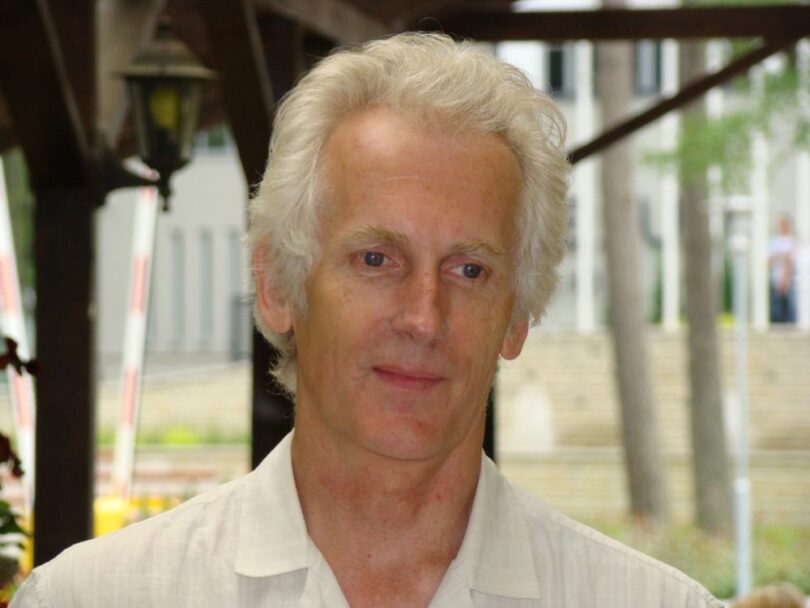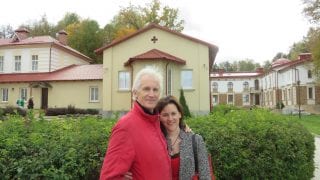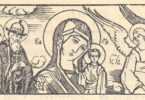Italics in Sluchevsky’s comments reflect his own vocal emphasis.
From Editor. We live in an eventful period. One hundred years after the forced termination of the All-Russia Church Council by the Bolshevik authorities, the minutes of that unique conciliar event have finally been published. Apparently, a similar hiatus was imposed on the implementation of Stolypin’s proposed agrarian reforms. One hundred years after Stolypin’s death, Nicholas V. Sluchevsky is attempting to develop a middle class in rural Russia by networking and sharing expertise through his Stolypin Center for Regional Development.
It was easy for me to talk to Mr. Sluchevsky, once I realized that we share the same understanding of the differences between the historical narrative that emerged from the welter of controversial, often unpalatable facts and the historical mythology that is based on the selective application of those facts.
Nicholas V. Sluchevsky was born in San Francisco in 1953. He is the great-grandson of Pyotr A. Stolypin on his maternal side and the author and poet Constantine C. Sluchevsky on his father’s. Stolypin became Prime Minister of Russia right after the 1905 revolution. His tough judicial reforms cost him his own life; leftists openly stalked Stolypin until in 1911 he was assassinated by Dmitry Bogrov. At the same time his agrarian reforms, although popular among the peasants, provoked a reaction from the right: Archbishop Antonii (Khrapovitskii) argued that the disintegration of rural communities into single farm estates would eventually lead peasants to abandon their Orthodox faith.
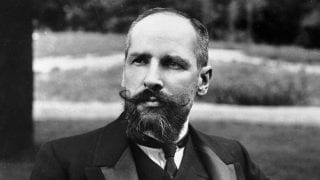
Peter A. Stolypin
Stolypin believed that the modernization of Russia should begin with the land, where most of the population toiled at the beginning of the twentieth century. In order to provide peasants with loans for the establishment of farms and to assist in relocation from central Russian provinces to scarcely populated areas of the Far East and Siberia, Stolypin founded the Zemsky bank.
One hundred years later, inexplicably, Nicholas Sluchevsky decided to implement the vision of his great grandfather. Sluchevsky lived and worked in California and came to Russia for the first time in 1994 as Country Managing Director at Rémy Cointreau, heading its regional office in Alma-Ata.
Although his fascination with Russia caused Nicholas to move to Moscow in 2010, a question that was touched upon in this interview remains to be dealt with: Is this the same country that his grandfather served, or is it the country that his father fled? Which brings us to our conversation.
Sluchevsky: [When we founded the Stolypin Center – A.P. ] everybody supported us, but I learned quickly there are two phrases in Russian that are very dangerous. One is чуть-чуть: ‘Can I give you a little bit more?’ The idea of a ‘little bit more’ in Russia is meaningless. Usually, it refers to vodka and means not 50 grams but half a liter. And the other is, ‘I support you.’ Nowadays, if somebody tells me that they are going to support me, I look for the emergency exit, and I run away as fast as I can.
But it’s very British to say one thing while meaning something else…
…The difference is, the British will in fact quite readily put up money, and what we mean by support is actually financial support: the British do in fact offer that kind of support.
If a Brit says to me, ‘You know, I’m a little bit uncomfortable’ it means ‘Can we get out of here?’
Oh, yes, absolutely. In Russia, the word “support” is unfortunately meaningless.
You must be bicultural, not just bilingual, to function here.
Well, yes, you have to be very much bicultural and it would take a great deal of time to understand this…
The problem might be even more deeply rooted than that.
Well, it is deeper – it goes back 600 years. It’s just that the terror of the last eighty had an additional impact that the previous 600 didn’t have.
Okay
And the problem is that stakeholders at the rural level, villagers, don’t trust each other, and if you have no trust between the players, you can throw all the money in the world at the problems and you’ll have no results. And there is no trust. Now, add to that the fact that Russia does not have a functioning rule of law. We have a rule of law: we have гражданский кодекс – the civil code. We have lots of things, some of it is even right, but if a bribe here, a bribe there, allows you to circumvent the law what’s the point of the civil code? Okay? Because the rule of law does not protect the small businessman effectively, it intensifies the mistrust among the players, and if you don’t have that trust, you will never get this country off its knees. Which then brings us back to the other big issue of the day: the patriotic chest-beating that Russia is a great power once again under President Putin. The image is beautiful, but if you dig beneath the image you find that the emperor has no clothes. What’s powerful? Our economy? The entire world gauges power based on economy, and yet our GDP is one-sixth that of California, despite all the oil. We are the largest energy producer in the world, and yet we have one-sixth the GDP of California. So, excuse me: it’s hard to understand why people so willingly believe the mythology, and even harder to understand why so many White Russian émigrés believe the lies.
They were brought up in this way. They emigrated into a Western world and in order to bring them up Russian, the feeling was instilled that to be Russian is really, really cool; they need to be very proud of their history, which was presented to them selectively, in sanitized fragments.
And [these selections are – AP] frequently mythological episodes of the past, as we know. But this is quite human. You cannot expect much else.
Absolutely. I’m stating it just as an objective fact; I’m not judging. So, you had Russians in the States who were extraordinarily anti-Soviet – not surprisingly: you know, they were Republicans, and pro-Reagan. Suddenly now they are completely pro-President Putin. 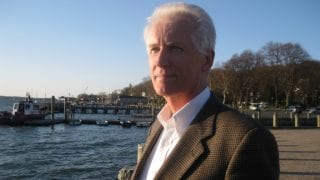 And objectively that raises an interesting question. What happened, right? The fact that the Russian elites hang crucifixes on their chest and start attending church suddenly absolves them of the whole Bolshevik history? In some ways, it did, because to these Russians, and these are the Russians that I grew up with, Russia is back as a world power, and that is what’s most important.
And objectively that raises an interesting question. What happened, right? The fact that the Russian elites hang crucifixes on their chest and start attending church suddenly absolves them of the whole Bolshevik history? In some ways, it did, because to these Russians, and these are the Russians that I grew up with, Russia is back as a world power, and that is what’s most important.
An empire…
But then in Russia, we have people who are Stalinist for exactly that same reason –because Stalin made Russia a great power. The fact that he killed 50 million people along the way – well, that was the price you had to pay to make Russia great. So that raises the question: Why was it so important for Russia to be this great world power, rather than developing itself, its culture, its economy and everything else?
We are all products of our social backgrounds and our time.
People’s identity changes organically over time. That’s simply an objective fact…
And the same is true for the Russian diaspora.
Absolutely. We are fundamentally different people who happen to speak the same language. [i.e., white émigrés and Russians in the homeland -A.P.] People get very angry with me for saying that, but it is purely an objective truth.
Would it be fair to say that Russians in diaspora are “better” Russians, or “truer” Russians, or “more authentic” Russians that Russians in Russia?
I am not even sure how true that is anymore. They are more authentic historically.
What do you mean by this?
Well, because, at least up to my generation, they carry on the tradition, right? Most of it is associated with the Russian Church, and we still carry on those traditions that go back to the nineteenth century, right? We grew up with those traditions. Again, I’m not saying that this is good or bad. It’s simply an objective fact. I know how I grew up. I know how my wife grew up …the kind of families. I grew up at the Russian School in San Francisco where our настоятель [rector] was Saint John of Shanghai. I knew him very well because he used to always come into class and sit behind me, and his посох, his episcopal staff, would strike my shoulder when I was misbehaving… so I knew Archbishop John very well! We grew up with that. And another thing that really annoys me about those ‘born again’ Russian Orthodox: you know, we have the платочки, headscarves. They drive me insane. It’s fine if you want to wear them as long as you recognize that it’s simply a tradition, and nothing more. Go ahead, wear them, but for a priest to prohibit somebody to come into church, and take [Holy] Communion because they’re not wearing a платочек… You see, it’s a fundamental violation! And you look back at photographs in America from the 40s, 50s, and 60s, during застолье, the festal meal of the Church Pascha, we still have photographs of Archbishop John of Shanghai at a table with all these women, and most of them are not wearing anything on their heads. That wasn’t part of how we grew up. It wasn’t part of our culture. As I said, it’s completely okay to do it if you understand that it is a tradition rooted, by and large, in peasant culture, where people did not have hygienic facilities, a lot of them in fact, so, if you had long hair, you covered your hair. I get the logic, but to say that something is canonical – that women must do this – no! Right?
No, I agree with
your point
on preservation of tradition, but, at the same time, some traditions were lost in the diaspora, and I would say that some were preserved in Russia.
Especially in a rural context… again, why did I live in a rural area (in the US)? To get back to my roots. The closer – and if this sounds clichéd, I apologize — the closer the person is to the land that produces the food that sustains society, the more real that person is. There is a reason that Stolypin, in his agricultural reforms, placed such emphasis on the peasantry, right? Number one: the peasant is the most conservative element in any society. Chinese, Russian, Armenian: it doesn’t matter. The peasant is always going to be the most conservative element of a society. The peasant is the carrier of the малая родина, of the ‘small homelands.’ Farmers in the world, farmers who are rural residents, carry the traditions around the world from Vietnam to Mexico to South Africa.
When you hear – and please publish this – when you hear the Minister of Culture, who, among other things, is on the Committee to Prevent the Falsification of History In Russia, and I’m all for preventing falsification of history, but when that same Minister of Culture attacks Sergei Mironenko and the State Archive of Russian Federation on the Pamfilovtsy issue and says, ‘How dare he say something like that and voice his opinion?’ when it was not an opinion: it is documented in the archive [Nicholas refers to an episode of World War II when it is claimed that a small contingent of the Soviet army stood up against German troops that greatly outnumbered -A.P.]. There is no opinion here, right? Those are real documents, objective documents. And then [he] comes out and says, ‘How dare you attack our sacred legends?’ How can you have both – falsification of history and sacred legends? Right? Now the insanity of that! And, so unfortunately, Russia is still – and too many of our White émigré community have bought into this – we are still chasing our sacred legends instead of picking up a shovel and getting to work. Enough of the sacred legends! Start building the country! Start building the economy! Start building families!
But it would depend on your motivation, and your motivation would go either from accepting tough truths and begin studying history in all its complexity or remaining in denial.
So, let’s talk about that, because I did an interview about a month and a half ago, for which I got a lot of criticism – first, because of my claim that the White Russian émigré community and the post-Soviet community really are very fundamentally different…
Yes, that what’s we’re trying to address in this conversation.
That’s one thing. Then there’s also this issue of reconciliation without redemption (примирение без раскаяния). That is a huge issue and in our next interview, I am going to go much deeper into that question, because – and this is a legitimate criticism: who is supposed to reconcile with whom about what? So, for example, if you’re 20 years old today, or you’re the grandson of a repressed peasant in Siberia, or wherever – it doesn’t matter – what do you have to reconcile with? You were a victim of that Bolshevik terror. What do you have to reconcile with? Obviously, obviously, nothing.
On the other hand, there are people who grew up elsewhere, as in some Babylonian captivity, like those Israelites who were taken elsewhere… they have a multiple identity: they are Americans, yet they have Russian roots. Are we going to repent in front of them? Are they going to receive our repentance? Are they in a position to do that? Are they?
No! It’s a much more complex issue and I deliberately stirred that pot because it’s a conversation that has to happen. I remember years ago Fr Georgii Mitrofanov made the comment, which I totally agree with, that until Russia repents, it will continue to be a cursed country. That’s a very radical statement. I do agree with it, but what does repentance (раскаяние) actually mean? And I want to start developing that topic because, obviously, I’m not talking on an individual level: that’s not the point. The point is sort of like original sin, right? This idea of atonement for Original Sin – that’s the level that we’re talking about. The problem is that in the Orthodox Church we do not have a rite of repentance for a collective. We have only individual…
Baptism would be a case…
But how do they do that on a collective level? That’s the conversation I want to have happened.
I see what you mean.
It’s a powerfully important thing…
Well, I probably can find some statements from the church hierarchy, made in the 1990s, regarding the Communist past, and, obviously, after the Time of Troubles in the seventeenth century there was an absolution prayer read for everyone who participated at the Time of Troubles, but I am sympathetic to what you are saying. Some kind of inventory of the past, and also repudiation, so that once and for all there is a line of demarcation.
There has to be. That conversation has to happen. It just has to happen. So many of Russia’s problems today, and a large reason (in my opinion) for the apathy of so many of the people… “Well, why should I do anything because it won’t change anything, right?” That’s what you hear today, and, frankly, this attitude has been in Russia probably for 600 years. The Mongolian law that succeeded the invasion and stayed in Russia essentially led to serfdom, right? It was what changed Russia.
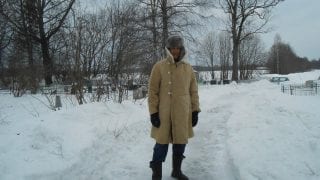
Borisovo-Sudskoye (Vologodskaya oblast) at Khvalevskoye Estate of Yura & Vera Voicehovsky (her ancestor – Kachalov – owned it and they fully restored it|)
It’s why the Far North and Siberia never had that, and the people are very different – they are more indigenous (коренные) people, psychologically very different. But you look at European Russia and the Cossacks (the Cossacks – those are willful people, right?) and you get a feeling for the Mongolian legacy. It never left us. In fact, Ivan the Terrible destroyed the last stronghold [of pre-Mongolian Rus’ –A.P] when he basically destroyed Smolensk, Novgorod, and Pskov, and also the merchant class.
And we have now this Stockholm syndrome.
And we have this Stockholm syndrome. Russia is the perfect case study of the Stockholm syndrome, I mean, in the aggregate. So, we speak in Jungian terms of the ‘collective unconscious’. Well, Russia’s collective unconscious is still extremely damaged, extremely damaged, and it will take a long time to overcome that, and one way is to overcome the current apathy – for people to actually start doing things for themselves. We’re a long way from that, but things are moving in that direction and I think that’s how Russia will ultimately rise like a phoenix from its ashes: it will rise from the bottom, not from the top down.
Thank you. Let’s stop at this point. I look forward to continuing our discussion.
Interview conducted by Andrei Psarev

